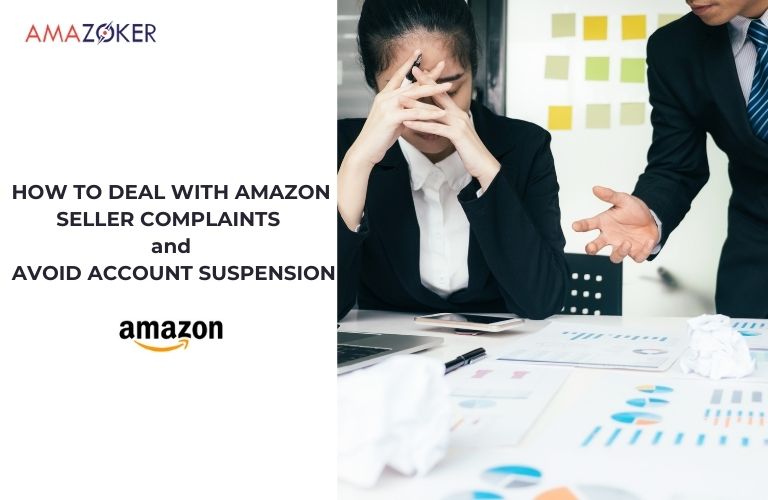Amazon is a great platform for selling products online and has strict policies and standards for sellers, so if you receive a complaint against Amazon, you need to act quickly and professionally to resolve the issue and prevent your account from being suspended. In this post, we will explain the different types of Amazon seller complaints, how to avoid them, and what to do if your account is suspended.
Table of Contents
Amazon Seller Complaints: Understand Feedback and Complaints
As an Amazon seller, you need to provide excellent customer service and follow Amazon’s policies and guidelines. Your performance as a seller is measured by various metrics, such as order defect rate (ODR), customer feedback, product reviews, and seller feedback. These metrics affect your seller rating, which influences your visibility and sales on Amazon.
Amazon customers can leave feedback and complaints about your products or services in different ways, such as:
- Product reviews: Customers can rate and review the products they buy on Amazon. Product reviews are visible to all customers and affect your product’s ranking and conversion rate.
- Seller feedback: Customers can rate and comment on your service as a seller, such as shipping speed, packaging quality, communication, etc. Seller feedback is visible on your seller profile and affects your seller rating and reputation.
- A-to-z Guarantee claims: Customers can request a refund or replacement from Amazon if they are not satisfied with their order or if they did not receive it. Amazon will investigate the claim and decide whether to grant it or not. A-to-z Guarantee claims count against your ODR and can lead to account suspension if they exceed 1% of your orders.
- Chargebacks: Customers can dispute a charge on their credit card if they did not authorize it or if they did not receive the product or service they paid for. Chargebacks are handled by the credit card company and Amazon. Chargebacks also count against your ODR and can lead to account suspension if they exceed 0.5% of your orders.
- Negative feedback removal requests: Customers can contact you directly through the Buyer-Seller Messaging Service or through the Contact Us page on Amazon to request that you remove or modify their negative feedback or review. You can respond to these requests and try to resolve the issue with the customer. You can also ask Amazon to remove feedback that violates their guidelines, such as feedback that contains personal information, profanity, promotional content, etc.
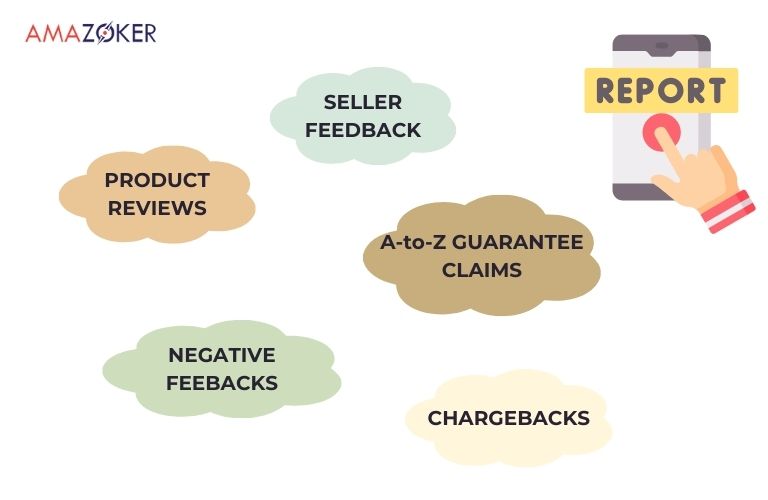
Types of Amazon Seller Complaints
You should monitor your seller performance metrics regularly and respond to customer feedback and complaints against Amazon promptly and professionally. You should also follow best practices to avoid receiving negative feedback or Amazon seller complaint in the first place, such as:
- Provide accurate and detailed product descriptions and images
- Use high-quality packaging materials and labels
- Ship orders on time and provide tracking information
- Communicate with customers proactively and politely
- Follow Amazon’s policies and guidelines for selling on their platform
Types of Amazon Seller Suspensions
If you receive too many Amazon seller complaints or violate Amazon’s policies or guidelines, you risk having your account suspended by Amazon. Account suspension means that you cannot sell on Amazon until you appeal the decision and reinstate your account. Depending on the severity of the issue, Amazon may also withhold your funds, remove your listings, or ban you permanently from selling on their platform.
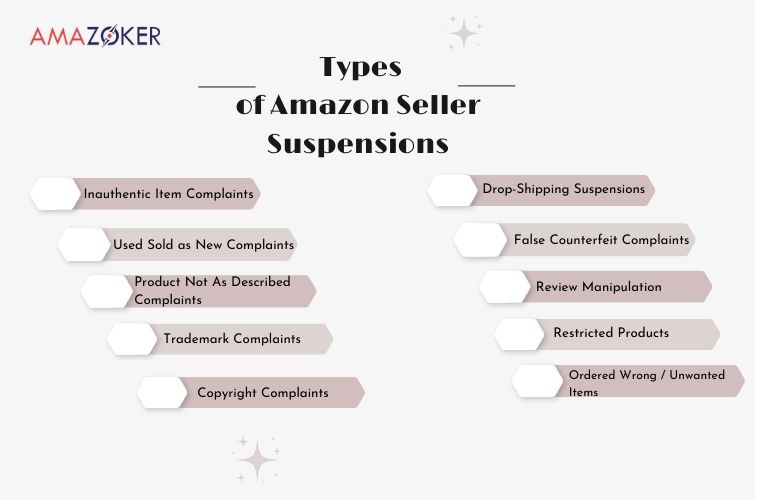
10 Types of Amazon Seller Suspensions related to Amazon seller complaints
There are different types of account suspensions that you may face as an Amazon seller, such as:
Inauthentic Item Complaints
Amazon expects sellers to provide authentic products that match the descriptions and images on their listings. If a customer or Amazon suspects that you are selling counterfeit, fake, or knock-off products, they may file an inauthentic item complaint against you. This could lead to the suspension or potential termination of your account.
To avoid inauthentic item complaints against Amazon, you should:
- Source your products from reputable suppliers and manufacturers
- Keep invoices, receipts, certificates, or other proof of authenticity for your products
- Use your own product images and descriptions instead of copying from other sellers or brands
- Avoid selling products that infringe on intellectual property rights of others
Used Sold As New Complaints
Amazon customers expect to receive new products when they buy from sellers who list their products as new. If a customer receives a product that is used, damaged, defective, or not in its original packaging, they may file a used sold as new complaint against you. This could lead to the suspension or potential termination of your account.
To avoid used sold as new complaints against, you should:
- Inspect your products before shipping them to ensure they are in new condition
- Use proper packaging materials and methods to protect your products during transit
- Avoid commingling your inventory with other sellers’ inventory
- Avoid selling products that have been returned by other customers without verifying their condition
Related / Multiple Amazon Accounts
Amazon allows sellers to have only one seller account per person or business entity. If you create or use multiple seller accounts without Amazon’s permission, you may be violating their policies and risking your account suspension. Amazon may also suspend your account if they find that you are related to another seller who has violated their policies or has a poor performance record.
To avoid related / amazon multiple account suspensions, you should:
- Use only one seller account unless you have a legitimate business reason and Amazon’s approval to have more
- Avoid sharing your account information or devices with other sellers
- Avoid selling the same or similar products or using the same or similar business names or addresses as other sellers
- Contact Amazon if you have any questions or concerns about your account status or relationship with other sellers
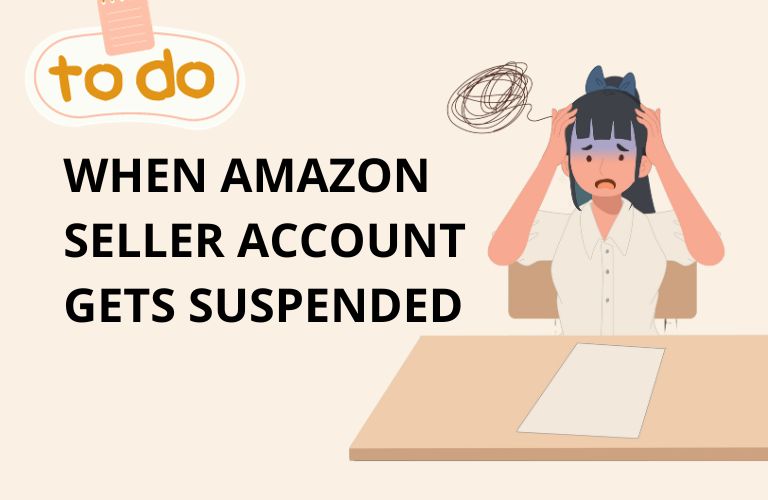
What should do to avoid multiple Amazon account suspension
Product Not As Described Complaints
Amazon customers expect to receive products that match the descriptions and images on the listings. If a customer receives a product that is different from what they ordered or expected, they may file a product not as described complaint against Amazon. This could lead to the suspension or potential termination of your account.
To avoid product not as described complaints against Amazon, you should:
- Provide accurate and detailed product descriptions and images
- Update your listings regularly to reflect any changes in your products or inventory
- Honor your product warranties and guarantees
- Accept returns and issue refunds according to Amazon’s policies and guidelines
Trademark Complaints
Amazon respects the intellectual property rights of others and expects sellers to do the same. If you sell products that infringe on the trademark rights of others, such as using their brand names, logos, slogans, or designs without their permission, you may receive an Amazon seller complaint or from the rights owner about the trademark. This could lead to the suspension or potential termination of your account. To avoid trademark complaints, you should:
- Verify that you have the right to use the trademarks of others before selling their products or using their brand elements on your listings.
- Obtain written permission from the trademark owners if you want to use their trademarks on your listings.
- Avoid using confusingly similar trademarks that may mislead customers or cause confusion.
- Remove any infringing products or listings immediately if you receive a trademark complaint against Amazon.
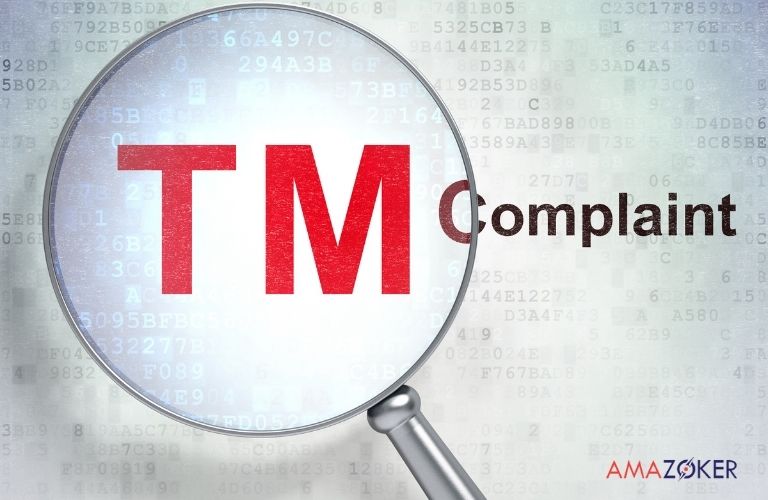
Trademark Complaints
Copyright Complaints
Amazon respects the intellectual property rights of others and expects sellers to do the same. If you sell products that infringe on the copyright rights of others, such as copying their works, such as books, music, movies, software, etc. Without their permission, you may receive an Amazon seller complaint from the rights owner or Amazon about copyright. This could lead to the suspension or potential termination of your account. To avoid copyright complaints, you should:
- Verify that you have the right to sell the works of others before listing them on Amazon
- Obtain written permission from the rights owners if you want to sell their works on Amazon
- Avoid copying or reproducing any works without authorization
- Remove any infringing products or listings immediately if you receive a copyright complaint
Drop-Shipping Suspensions
Drop-shipping is a business model where you sell products that you do not own or stock yourself. Instead, you rely on a third-party supplier to fulfill the orders for you. Amazon allows sellers to use drop-shipping as long as they follow their policies and guidelines.
However, if you use drop-shipping in a way that violates Amazon’s policies or causes customer dissatisfaction, you may face account suspension after receiving complaints against Amazon. To avoid drop-shipping suspensions, you should:
- Use only reputable and reliable suppliers who can deliver quality products on time and in good condition
- Ensure that your suppliers do not include any invoices, packing slips, promotional materials, or other information that identifies them as the seller
- Ensure that your suppliers ship the products using your own shipping labels and information
- Take full responsibility for the customer service and returns of the products you sell
>> Read more: Amazon dropshipping policy

Understand how dropshipping on Amazon work to avoid suspension
False Counterfeit Complaints
False counterfeit complaints are complaints that are made by malicious competitors or customers who falsely accuse you of selling counterfeit products. These complaints are intended to harm your reputation and sales on Amazon. False counterfeit complaints against Amazon can result in your account being suspended or even terminated. To avoid false counterfeit complaints, you should:
- Keep invoices, receipts, certificates, or other proof of authenticity for your products
- Respond to any counterfeit complaints promptly and professionally
- Provide evidence that your products are authentic and request Amazon to remove the false complaint
- Report any false counterfeit complaints to Amazon and request them to investigate the source of the complaint
Review Manipulation
Review manipulation is any attempt to influence or manipulate customer reviews on Amazon. This includes offering incentives, rewards, discounts, free products, or other benefits in exchange for positive reviews; posting fake reviews; deleting negative reviews; voting up positive reviews; voting down negative reviews; etc. Review manipulation violates Amazon’s policies and guidelines and can result in your account being suspended or even terminated if you are complained against by Amazon. To avoid review manipulation, you should:
- Follow Amazon’s policies and guidelines for requesting and writing customer reviews.
- Avoid asking customers to write positive reviews or change negative reviews.
- Avoid offering any incentives, rewards, discounts, free products, or other benefits in exchange for reviews.
- Avoid posting fake reviews or hiring others to do so.
- Report any suspicious or abusive reviews to Amazon and request them to remove them.
Restricted Products
Amazon has a list of products that are prohibited or restricted from being sold on their platform. These products include illegal, unsafe, offensive, or inappropriate items that may violate laws, regulations, or Amazon’s policies and guidelines. If you sell any restricted products on Amazon, you may receive an Amazon seller complaint from a customer, a government agency, or Amazon. This could lead to the suspension or potential termination of your account. To avoid restricted product complaints, you should:
- Check Amazon’s list of prohibited and restricted products before listing any products on their platform.
- Comply with all applicable laws, regulations, and Amazon’s policies and guidelines for selling your products.
- Remove any restricted products from your inventory immediately if you receive a complaint against Amazon or a notice from Amazon.
- Contact Amazon if you have any questions or doubts about the eligibility of your products.
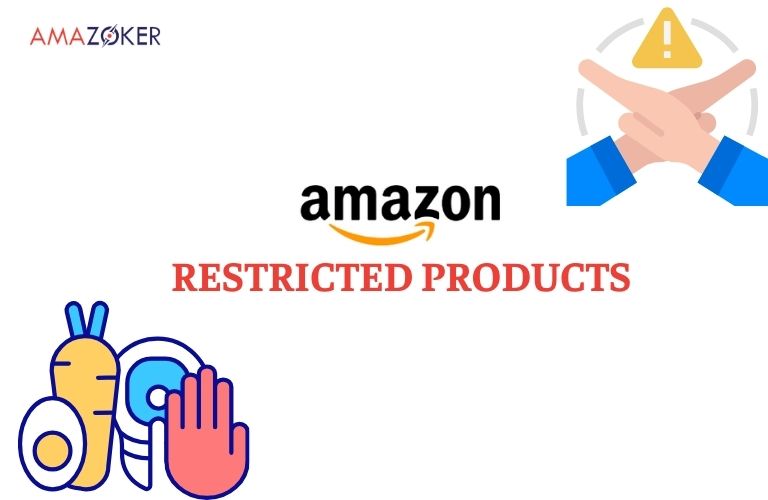
Restricted Products
Ordered Wrong / Unwanted Items
Sometimes, customers may order the wrong or unwanted items by mistake or change their mind after placing an order. In these cases, customers may request to cancel the order, return the item, or exchange it for another item. These requests may affect your seller performance metrics and customer satisfaction due to Amazon seller complaints.
To handle ordered wrong / unwanted item requests, you should:
- Respond to customer requests promptly and professionally.
- Honor your cancellation, return, and exchange policies according to Amazon’s policies and guidelines.
- Issue refunds or replacements as soon as possible.
- Communicate with customers throughout the process and provide them with confirmation and tracking information.
What to Do When Your Account Is Complained and Suspended
If your account receives Amazon seller complaints and is suspended by Amazon, you should not panic or give up. Instead, you should take the following steps to appeal the decision and reinstate your account:
Understanding and Addressing Customer Complaints on Amazon
Understanding the nuances of customer dissatisfaction and having effective strategies to address these concerns is crucial for maintaining a positive seller reputation and ensuring business longevity.
- Reading with Precision: Take the time to meticulously peruse the customer’s message, focusing on each word and detail articulated in the complaint. This comprehensive approach ensures a holistic understanding of the problem, facilitating an appropriate response.
- Expressing Empathy: Demonstrating empathy towards the customer is paramount. Strive to empathize with their situation, acknowledging their frustrations or concerns. This approach cultivates an environment of trust conducive to finding a resolution.
- Asking Clarifying Questions: When aspects of the customer’s complaint remain unclear, it’s beneficial to inquire for additional information. Doing so aids in obtaining a comprehensive view of the situation, mitigating potential misunderstandings. Ensure these questions are posed respectfully and with a genuine intent to resolve the issue.
- Mitigating Defensive Reactions: Although receiving a complaint may elicit defensive emotions, it’s vital to manage these feelings. Refrain from impulsive or personal reactions. Maintain composure and remember the ultimate aim: resolving the issue satisfactorily for both parties involved.
- Validating Understanding: Prior to proceeding, confirm your accurate comprehension of the customer’s complaint. Briefly summarize their concerns to affirm alignment. This practice prevents misunderstandings and underscores your dedication to addressing their situation effectively.
Ensure timely and professional responses:
- Act promptly upon receipt: Upon receiving a complaint on Amazon, prioritize immediate action. Swift and effective service resonates positively with customers, showcasing your dedication to their satisfaction while preventing potential escalations.
- Maintain a friendly and respectful tone: The manner in which you communicate is pivotal. Adopt a warm and courteous tone in all interactions, even when dealing with challenging or unjustified complaints. Remember, your responses reflect your business, and a professional approach significantly impacts the customer’s perception.
- Communicate clearly and succinctly: When crafting your responses, ensure clarity and conciseness. Avoid complex technical language that might confuse customers. Instead, offer straightforward explanations outlining your plan to address their concerns and provide a satisfactory resolution.
- Demonstrate a commitment to resolution: Express your willingness to resolve the issue satisfactorily. Present practical and feasible solutions that exhibit your dedication to finding an appropriate remedy. When needed, offer alternative options to meet the customer’s requirements.
Acknowledge the issue and take responsibility for it
- Read the suspension notice carefully and understand the reason and the evidence for the suspension.
- Review your seller performance metrics and identify any areas of improvement
- Gather any documents or information that can support your appeal, such as invoices, receipts, certificates, proof of authenticity, customer communication records, etc.
- Write a professional and persuasive appeal letter that addresses the following points.
- Acknowledge the issue and take responsibility for it.
- Explain the root cause and the impact of the issue.
- Describe the corrective actions and preventive measures you have taken or will take to resolve the issue and prevent it from happening again.
- Express your commitment and willingness to cooperate with Amazon and follow their policies and guidelines.
- Request Amazon to reinstate your account and restore your selling privileges.
- Submit your appeal letter along with any supporting documents or information to Amazon through the Seller Central portal or by email.
- Wait for Amazon’s response patiently and respectfully. Do not spam them with multiple messages or calls. Follow up only if necessary.
- If your appeal is accepted, follow Amazon’s instructions to reinstate your account and resume selling. If your appeal is rejected, you can request a second review or contact a third-party service provider who can help you with your case.

Actions needed if Your Account Is Complained and Suspended
Amazoker – a provider of solutions for sellers on Amazon
Amazon seller complaints are inevitable in online selling, but they can be avoided or resolved with proper care and attention. By following Amazon’s policies and guidelines, providing excellent customer service, monitoring your seller performance metrics, responding to customer feedback and complaints promptly and professionally, and appealing any account suspension effectively, you can maintain a good reputation and a successful business on Amazon.
If you are looking for a service that can help you with Amazon seller complaints or account recovery, you may want to check out Amazoker. Amazoker is a company that provides Amazon appeal service, account suspension appeal, and other solutions for Amazon sellers. According to their website Amazoker.com, they claim to have a team of experts who can handle various types of Amazon seller issues, such as:
Inauthentic item complaints
- Used sold as new complaints
- Related / multiple Amazon accounts
- Product not as described complaints
- Trademark complaints
- Copyright complaints
- Drop-shipping suspensions
- False counterfeit complaints
- Review manipulation
- Restricted products
- Ordered wrong / unwanted items
Frequently asked questions
Q: How do I report a bad seller on Amazon?
Reporting a bad seller on Amazon involves logging into your account, navigating to the order with the issue, and selecting the problem category from the dropdown menu. Provide a detailed description, attach evidence, and submit the report, ensuring a safer and more reliable marketplace for all users.
Q: How do I make a complaint against Amazon?
To make a complaint against Amazon, visit the “Contact Us” page on their website, choose the appropriate category for your complaint, and follow the prompts to provide details and submit your grievance. Alternatively, you can reach out to Amazon customer support through their helpline or email to address specific issues and seek resolution.
Q: How do I escalate an Amazon seller issue?
To escalate an Amazon seller issue, you can go to the “Help” or “Contact Us” section on the Amazon Seller Central dashboard, select the issue you’re facing, and then choose the option to escalate or request a supervisor. Additionally, reaching out to Amazon’s seller support through phone or email and clearly expressing the urgency of your concern may prompt a quicker resolution or escalation.
Q: How do I contact Amazon seller support?
To contact Amazon Seller Support, log in to your Amazon Seller Central account, go to the “Help” or “Contact Us” section, and choose the appropriate category for your inquiry. You can then select the preferred method of communication, which may include chat, phone, or email, to connect with Amazon’s seller support team.
In conclusion, addressing Amazon seller complaints is crucial for maintaining a positive seller reputation and customer satisfaction. Promptly resolving issues, communicating effectively with customers, and continuously improving processes are key to long-term success in the Amazon marketplace. If you need more assistance or guidance on how to deal with complaints, you can also refer to Amazoker website services or contact Amazoker via hotline +1 580 262 6126 to get advice on how to handle it effectively.







